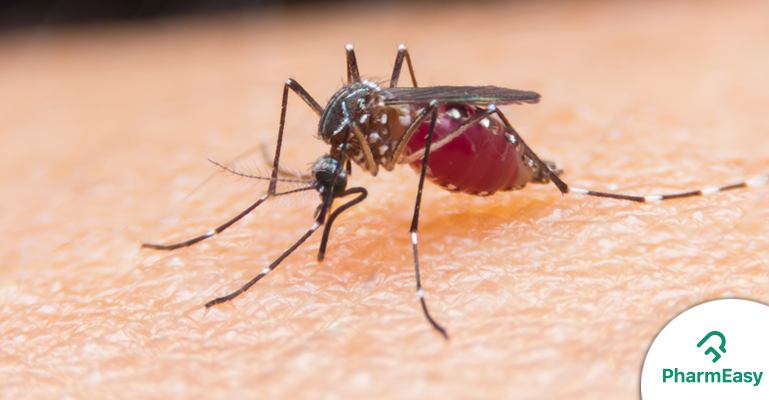All You Need To Know About Malaria!
By Dr. Nikita Toshi +2 more

Get,

to manage your symptom
Get your,


4 Cr+ families
benefitted

OTP sent to 9988776655



You’ve successfully subscribed to receive
doctor-approved tips on
Whatsapp

Get ready to feel your best.

Hi There,



Register to Avail the Offer
Send OTPBy continuing, you agree with our Privacy Policy and Terms and Conditions

Hi There,

Trusted by 4 crore+ families

OTP sent to 9988776655



You have unlocked 25% off on medicines




Code: NU25

By Dr. Nikita Toshi +2 more
The dreaded mosquito pinches your skin, and as you swat the poor fellow, you imagine all the issues that prospective malaria disease will bring. As you slap that one away to oblivion, know that not all mosquitoes cause malaria. Only Anopheles mosquito, when infected by a parasite- Plasmodium, causes malaria.
Table of Contents
When the malaria parasite infects the Anopheles mosquito, it starts its lifecycle in the malaria mosquito’s body. Each of the subspecies of this parasite causes different symptoms and responds to different treatments. Upon getting transferred to the human body when the malaria mosquito bites, it first goes to the liver to multiply and finally attacks the red blood cells.

Malaria is not a communicable disease because it does not spread from person to person. Once the mosquito has bitten, it can take anywhere from seven to 20 days for the malaria symptoms to appear.
The incubation period of malaria disease is anywhere from one week on wards. The spectrum of malaria symptoms is quite broad. Depending on what the symptoms are, it can be divided into two kinds.
In this kind, the patient suffers from
When other body systems come under attack, it is termed as Complicated Malaria. The symptoms are:
Your general physician to an infectious-disease specialist can treat malaria disease. The malaria treatment has to be comprehensive and must ensure that the condition has been rooted out entirely else recurrence in milder forms is a possibility. All the below points help in the diagnosis of malaria disease.
Antimalaria medicines are used to treat the condition. If the malaria is uncomplicated, oral dosages can cure. Antimalaria medicines like quinine, amodiaquine, lumefantrine, sulfadoxine are used in combination with artemisinins.
For complicated malaria, the antimalaria medicines are given intravenously. Blood sugar, respiratory distress, and blood potassium are monitored explicitly in malaria in children.
Also Read: How to Get Rid of Gnats: Your Expert-Approved Guide
There are no vaccines for malaria. Malaria precautions include prevention of bites from the malaria mosquito.
Also Read: Foods That Kill Parasites in Humans: A Comprehensive, Research-Based Guide
Disclaimer: The information provided here is for educational/awareness purposes only and is not intended to be a substitute for medical treatment by a healthcare professional and should not be relied upon to diagnose or treat any medical condition. The reader should consult a registered medical practitioner to determine the appropriateness of the information and before consuming any medication. PharmEasy does not provide any guarantee or warranty (express or implied) regarding the accuracy, adequacy, completeness, legality, reliability or usefulness of the information; and disclaims any liability arising thereof.
Links and product recommendations in the information provided here are advertisements of third-party products available on the website. PharmEasy does not make any representation on the accuracy or suitability of such products/services. Advertisements do not influence the editorial decisions or content. The information in this blog is subject to change without notice. The authors and administrators reserve the right to modify, add, or remove content without notification. It is your responsibility to review this disclaimer regularly for any changes.

Leave your comment...
Comments